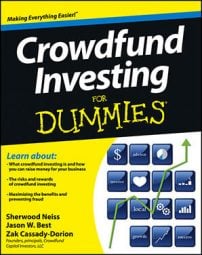You should never put more than 10 percent of your financial portfolio into crowdfund investments. (You may even consider something closer to the 5 percent range.) This limit is wise even if more than 10 percent of your portfolio is allocated to high-risk stocks.
And if you and your financial advisor have determined that your allocation to high-risk stocks should be even lower (5 percent, for example), you don’t want your crowdfund investments to push you over that limit.
Therefore, if you’re considering crowdfund investing for your portfolio, you first must determine if you have any room for it. When you scan your entire portfolio and look at your spectrum of investments, find the total amount you already have in high-risk investments and figure out what percentage it represents of your total portfolio.
(If you have most or all of your investments in one brokerage house, you may be able to put your finger on that percentage pretty easily. Otherwise, it’s time to sharpen your math or spreadsheet skills.)
If you’ve already maxed out your high-risk investment percentage, don’t put a dime into crowdfund investing unless and until you divest from another high-risk asset class. Either sell off another high-risk investment, or walk away from this type of investing. Don’t play with your portfolio percentages by convincing yourself that “just 5 percent in this kind of investment isn’t going to hurt.”
You need to be able to sleep at night if your investments hit the dirt. When and if that happens “just 5 percent” is going to feel like a lot.
A second — and equally important — factor that plays into your crowdfund investment limit is this: The JOBS Act limits how much investors can risk with crowdfund investing. The Securities and Exchange Commission (SEC) won’t allow you to invest every spare dollar in these types of ventures. The legislation was crafted carefully to avoid the prospect of investors gone wild.
Here are the investment limits, which are based on annual salary:
| If you make . . . | You can make crowdfund investments up to . . . |
|---|---|
| Less than $40,000 | $2,000 |
| $40,000 to $99,999.99 | 5% of your annual salary or net worth |
| $100,000 or more | 10% of your annual salary or net worth up to $100,000 |

